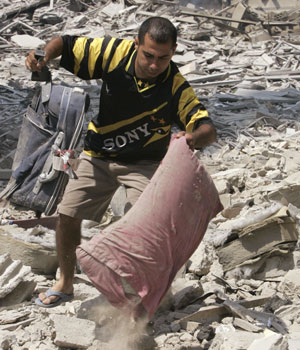
A Lebanese man holds his belongings from his destroyed apartment in southern Beirut, a Hezbollah stronghold targeted by Israeli air strikes, July 27, 2006 (REUTERS)
BEIRUT (Reuters) – Israeli warplanes bombed Lebanon on Friday as the Jewish state called up 15,000 reserve soldiers and diplomatic divisions appeared to widen over how to end the 17-day-old conflict.
Israel decided on Thursday to pursue air strikes and limited ground incursions to halt rocket attacks on northern Israeli towns by Hezbollah guerrillas rather than mount a full-scale invasion of Lebanon.
“We are preparing reserves who will be ready until an order is given (to deploy),” Israeli Defence Minister Amir Peretz told a news conference at which the call-up was announced. Israeli jets hammered parts of Lebanon’s eastern Bekaa Valley on Friday.
Diplomatic splits over the war seemed to be growing. Calls for an immediate truce have mounted as humanitarian conditions in Lebanon have worsened and the civilian death toll rises.
U.S. President George W. Bush said on Thursday he wanted an end to the conflict as soon as possible but not a “fake peace” that would only delay further fighting.
But Prime Minister Tony Blair, a close ally of Bush, is facing pressure to distance himself from the U.S. stance when he holds talks with the U.S. president in Washington on Friday.
As he did over Iraq, Blair has sided with the United States over the Israel-Hezbollah violence, putting Britain at odds with Arab nations and European allies calling for an immediate truce.
Lebanese Health Minister Mohammad Khalifeh said up to 600 people had been killed in the conflict, around a third of them still buried beneath rubble with rescue workers unable to remove the bodies while under fire.
Bodies still lie in the streets in some isolated Lebanese border villages, where fighting has trapped terrified civilians, the International Committee of the Red Cross (ICRC) said.
At least 445 people, most civilians, have been confirmed killed in Lebanon, according to a Reuters tally. Fifty-one Israelis, including 18 civilians, have been killed since the conflict was triggered on July 12 when Hezbollah captured two Israeli soldiers and killed eight in a cross-border raid.
Israel decided against a major expansion of the ground war a day after nine Israeli soldiers were killed in Lebanon, the army’s heaviest one-day loss in the conflict.
The Jewish state does not want to get bogged down in south Lebanon only six years after it pulled troops out after a two-decade presence.
The United States has effectively given Israel the green light to pursue its offensive by refusing to call for an immediate truce or to allow the U.N. Security Council to do so.
“My goal is … to hopefully end this as quickly as possible and at the same time making sure there is a lasting peace, not a fake peace,” Bush told reporters in Washington.
France said it was disappointed an international conference in Rome on Wednesday had failed to call for an immediate end to hostilities and urged U.N. Security Council foreign ministers to meet next week to work on a cease-fire resolution.
European Union president Finland said Israel might have drawn the wrong conclusion from the Rome conference by believing it had been allowed to continue its offensive against Hezbollah.
U.N. Security Council members agreed a statement expressing shock and distress at Israel’s bombing of a U.N. post in southern Lebanon that killed four U.N. military observers. They called on Israel to conduct a comprehensive inquiry.
The statement was weaker than one proposed by China and others after objections from Washington, which wanted to ensure Israel was not directly or indirectly blamed for the attack.
U.S. Secretary of State Condoleezza Rice, who visited Beirut and Jerusalem this week, said she would return to the region if she believed she could clinch a lasting peace in Lebanon.
Her comments, made on arrival in Malaysia for a regional security conference, underlined Washington’s intention not to press Israel to stop fighting until Hezbollah guerrillas, backed by Iran and Syria, had been significantly weakened.
Dozens of Hezbollah rockets landed in northern Israel on Thursday, wounding four people. More than 1,400 rockets have hit Israel since the conflict began.
The conflict has largely overshadowed separate fighting in the Gaza Strip.
Israeli forces targeting gunmen killed five civilians in Gaza on Thursday, Palestinian medics said, while police at a checkpoint in Jerusalem killed a Palestinian who shot at them.
Those who killed on Thursday included a 75-year-old woman, whose house was hit by a missile or shell. A 12-year-old boy was killed by a bullet that witnesses said was fired by an Israeli tank in northern Gaza.
With anger among Arabs and Muslims mounting over Israel’s offensives in Lebanon and the Gaza Strip, al Qaeda declared it would not stand by and urged Muslims to fight.
“How can we remain silent while watching bombs raining on our people?” al Qaeda’s deputy leader Ayman al-Zawahri said in a video taped address broadcast on Al Jazeera.

Smoke billows in the town of Khiam, in southern Lebanon,July 28, 2006, after an Israeli attack (AP)

Demonstrators in front of the Israeli Consulate protest Israel’s attack on Lebanon and demand that Israel withdraw, 27 July 2006 in Los Angeles, California (AFP)
